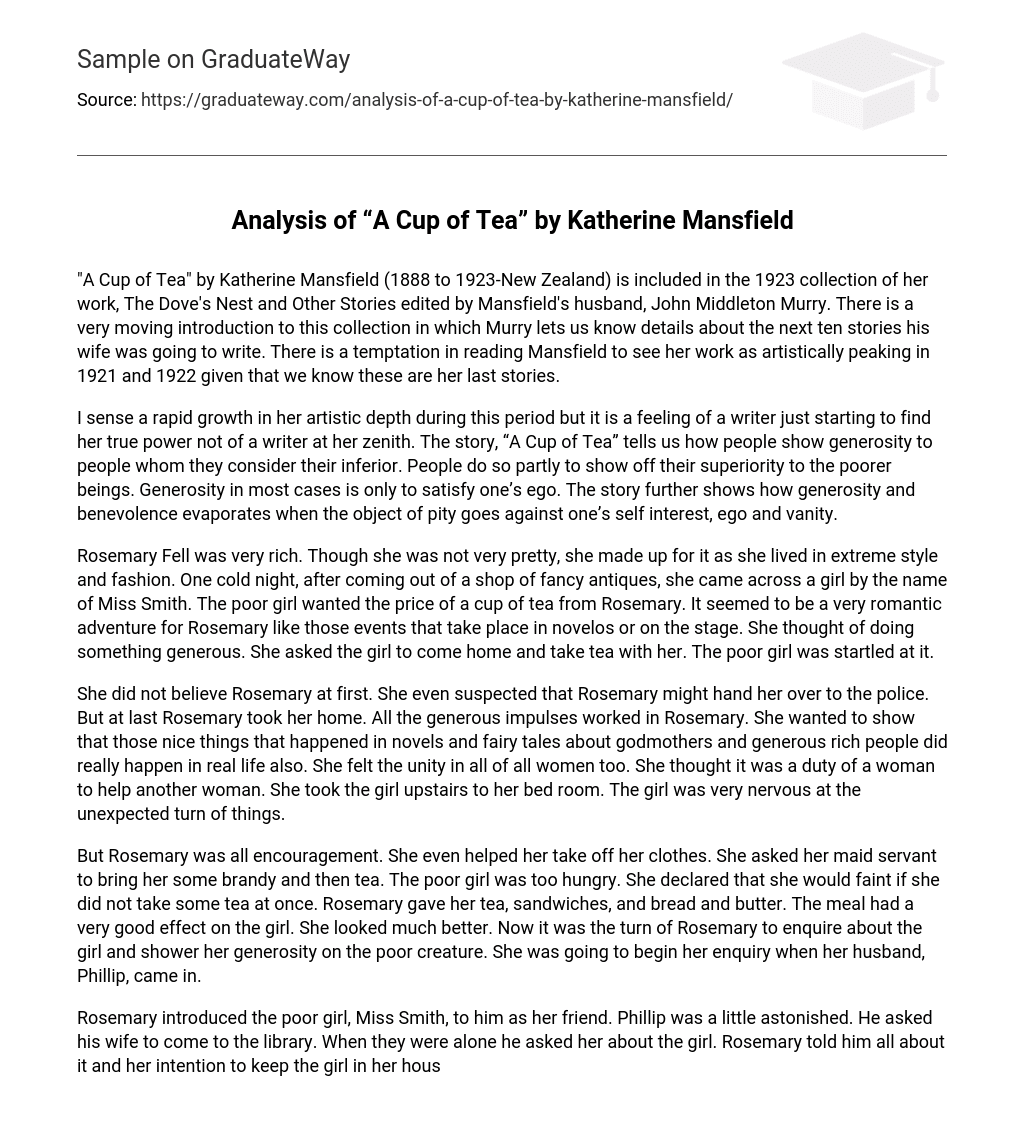“A Cup of Tea” by Katherine Mansfield (1888 to 1923-New Zealand) is included in the 1923 collection of her work, The Dove’s Nest and Other Stories edited by Mansfield’s husband, John Middleton Murry. There is a very moving introduction to this collection in which Murry lets us know details about the next ten stories his wife was going to write. There is a temptation in reading Mansfield to see her work as artistically peaking in 1921 and 1922 given that we know these are her last stories.
I sense a rapid growth in her artistic depth during this period but it is a feeling of a writer just starting to find her true power not of a writer at her zenith. The story, “A Cup of Tea” tells us how people show generosity to people whom they consider their inferior. People do so partly to show off their superiority to the poorer beings. Generosity in most cases is only to satisfy one’s ego. The story further shows how generosity and benevolence evaporates when the object of pity goes against one’s self interest, ego and vanity.
Rosemary Fell was very rich. Though she was not very pretty, she made up for it as she lived in extreme style and fashion. One cold night, after coming out of a shop of fancy antiques, she came across a girl by the name of Miss Smith. The poor girl wanted the price of a cup of tea from Rosemary. It seemed to be a very romantic adventure for Rosemary like those events that take place in novelos or on the stage. She thought of doing something generous. She asked the girl to come home and take tea with her. The poor girl was startled at it.
She did not believe Rosemary at first. She even suspected that Rosemary might hand her over to the police. But at last Rosemary took her home. All the generous impulses worked in Rosemary. She wanted to show that those nice things that happened in novels and fairy tales about godmothers and generous rich people did really happen in real life also. She felt the unity in all of all women too. She thought it was a duty of a woman to help another woman. She took the girl upstairs to her bed room. The girl was very nervous at the unexpected turn of things.
But Rosemary was all encouragement. She even helped her take off her clothes. She asked her maid servant to bring her some brandy and then tea. The poor girl was too hungry. She declared that she would faint if she did not take some tea at once. Rosemary gave her tea, sandwiches, and bread and butter. The meal had a very good effect on the girl. She looked much better. Now it was the turn of Rosemary to enquire about the girl and shower her generosity on the poor creature. She was going to begin her enquiry when her husband, Phillip, came in.
Rosemary introduced the poor girl, Miss Smith, to him as her friend. Phillip was a little astonished. He asked his wife to come to the library. When they were alone he asked her about the girl. Rosemary told him all about it and her intention to keep the girl in her house and be generous to her. Phillip, a practical man, knew that it was not practical. He told his wife. But Rosemary who knew more of romantic novels than life would not listen to him. She only wondered why it was not possible if it could be possible in books.
The husband knew more about life. He replied that it was not possible because Miss Smith was very pretty and he was almost bowled over when he first saw her. He even warned her that it would be a mistake if she kept her in the house. The wise husband’s arrow hit the right point. The great generosity of Rosemary faced an acid test of reality. She was jealous of the poor girl whom her husband found so pretty. Her romantic generosity simply evaporated like vapor in the face of petty jealousy. Rosemary went away to her writing room.
She took out three pounds. She gave the girl the money and sent her away. Rosemary put on her nice dress, did her hair, darkened her eyes, put her pearls and came to her husband. She told him that Miss Smith would not stay for dinner and that she gave her some money. Suddenly she asked him whether he liked her. She asked him to kiss her and asked him whether she could buy the little box that she had seen in the antique shop. At last she asked him if she was pretty. Rosemary was jealous. She wanted to be reassured that her husband loved her still.





